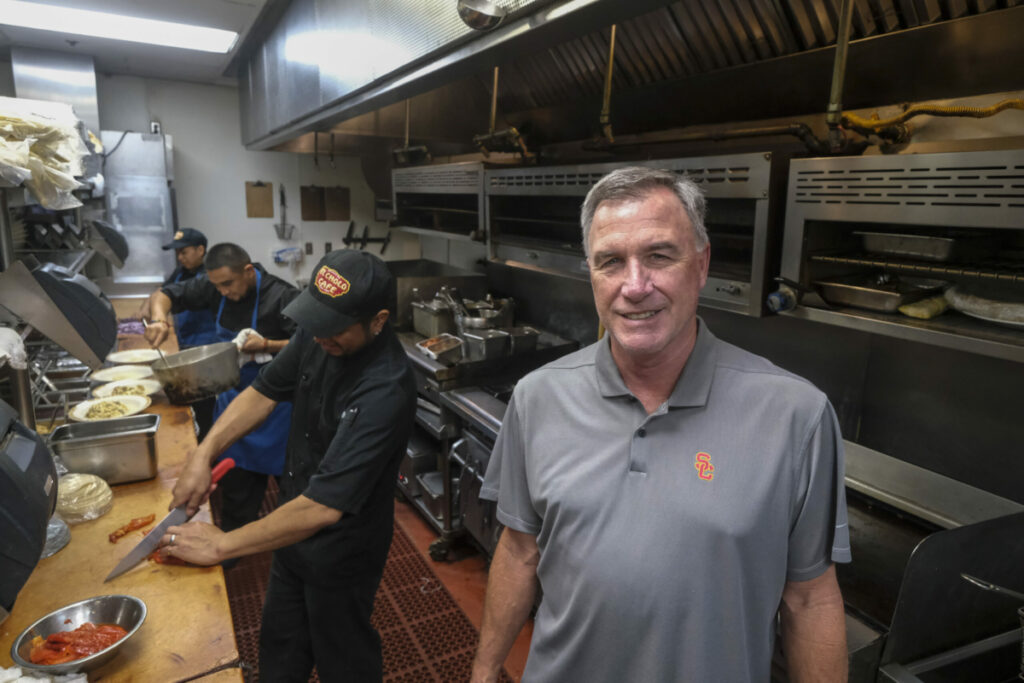Blair Salisbury is moving ahead with franchising Daddy’s Chicken Shack locations in Southern California.
But the Pasadena restaurant owner doesn’t think it will be easy to get franchisees on board, and he places the blame on a bill passed by California lawmakers in August and signed into law by Gov. Gavin Newsom last month that, among other things, creates a so-called food council with power to set wages and make new regulations for the fast-food industry.

Salisbury, who earlier told the Business Journal he may not proceed with Daddy’s because of the new law, said he decided to go ahead with finding franchisees – he has five years to procure 19 of them – after the bill was amended to cap the minimum wage at $22 an hour, with cost-of-living increases allowed in the future.
“I think it will be much more of a challenge for me to find people who will want to operate (a Daddy’s franchise),” Salisbury said. “Unless my brand does very good in volume sales, then they might say, ‘Well it’s worth the entire labor (cost).’”
The new law, Assembly Bill 257, also known as the FAST Act, creates, among other things, a 10-member council that would set new wage, scheduling and operating rules for fast food restaurants.
The council will sunset on Jan. 1, 2029, and until that time can set minimum standards related to the health, safety, and welfare of fast-food workers. The council’s orders will apply to restaurants in the state that are part of a set of fast-food restaurants consisting of 100 or more establishments nationally that share a common brand. Corporate-owned restaurants would also come under its jurisdiction, as well as those owned by franchisees.
As Salisbury has the only location of Daddy’s Chicken Shack currently open in Pasadena, he wouldn’t fall directly under the law’s regulations, but it would still affect him, partly because he’d have to pay the higher wages to stay competitive.
Bigger effects
According to Jeff Hanscom, vice president of state and local government relations and public policy for the International Franchise Association, a Washington, D.C.-based advocacy group, the association has determined that there are 150 restaurant brands that meet the definition to be covered by AB 257, representing about 16,000 locations in the state.
“That is not an insignificant number of restaurant establishments by any stretch of the imagination,” Hanscom said.
It is worth noting, he continued, that the restaurant space covered by the law is a lot larger than people might understand.
While the media has focused on fast food restaurants, the law covers any establishment where a customer pays before they eat and there is little to no table service, Hanscom said.
So that takes in everything from the traditional fast-food places to an ice cream store or a bagel store or a yogurt shop, he said.
“The list goes on and on and on. It’s not just burgers and fries that are covered by AB 257,” Hanscom added.
Association research determined that 70% of California residents go to a quick-service restaurant at least once a week, he continued.
If wages go up by 60%, the amount consumers pay will likely go up 20% to 22%, according to a study by the UC Riverside Center for Economic Forecast and Development.
A 60% increase in labor costs has a dramatic impact on business owners, who already operate on thin margins within the restaurant space, Hanscom said.
What that will ultimately do is force owners into making hard decisions – to cut staff, cut hours, move to automation, or even close down restaurant locations, he added.
“AB 257 is a pretty big rock thrown into a pond with a lot of ripple effects,” Hanscom said.

Hard to compete
Those affected will include businesses not directly impacted by the law.
Take Salisbury as an example.
He owns the El Cholo restaurant on Colorado Boulevard in Pasadena. It is part of a small chain operated by his family for nearly 100 years.
If other restaurants are offering $22 an hour as a minimum wage, as he expects will happen once the food council begins meeting next year, that would make it difficult for him to compete, Salisbury said.
“They make this sound like this is to go after the big corporations, the McDonald’s of the world and Starbucks, but it will take the mom and pops, too,” he added. “Because the mom and pops won’t be able to compete and pay the higher wage. They’ll lose employees.”
“If you are faced with trying to recruit talent at your restaurant and the neighboring restaurant is required to pay $22 an hour and you’re not and you can’t, that is going to have a lot of downstream impact on the labor force and business owners in California,” Hanscom added.
Jesse Lara is an area leader/safety coordinator for an El Pollo Loco franchisee based in Oceanside. The company has locations throughout the Los Angeles area, including in Rowland Heights and Culver City, and south into Orange County and down to San Diego.
His father, Angel Lara, is the head of the company and its vice president of operations, the younger Lara said.
The actual cost to the business from the policy changes brought by the law are unknown, he said.
“We have an idea based off of what they are projecting the hourly rates to be, but we don’t know more beyond that,” Jesse Lara added.
The company is not doing anything different for the time being, not wanting to jump the gun on any potential changes, he continued.
“We are not going to put too much panic or fear out there and riling people up for no reason,” Lara said.
He added that it’s tough to be in this position of being a small-business owner and being villainized and accused of ripping off employees.
“It’s really something that started on a false premise,” Lara said. “This feels like a personal attack at this point.”
He also finds it “frustrating” to have the food council come in and tell him how to operate the family business.
“It’s disheartening, to say the least, to see all the work that’s been put in (to his business) over the last 35 years pushed to the wayside if this comes about,” Lara said.
Upcoming battle
The industry is gathering its forces to fight the bill.
A new group, the Save Local Restaurants Coalition, which is led by the International Franchise Association, the National Restaurant Association and the U.S. Chamber of Commerce, is gathering signatures to get a ballot initiative before voters in the 2024 general election.
“Neighborhood restaurants provide first jobs and lifetime careers; dining choice and value for hard working Californians; and economic opportunities for underrepresented entrepreneurs across the state,” the coalition said in a statement.
The businesses targeted by the law already have strict rules in place to protect both workers and consumers, but those can now be overridden by a small, unelected council, the group’s statement said, adding, “This will stifle job growth and push up prices.”
The greatest impact of the estimated 20% increase in food prices at counter-service establishments will be on lower-income households and communities of color, the group added.
“Before these repercussions hit the state, it is only right that California voters have a say in whether they must shoulder the burden of higher prices and job losses, as small businesses are forced to limit opportunities, lay off employees or close altogether,” the coalition said.
“Given less than one-third of Californians support AB 257, it is critical they have the opportunity to have their voices heard and hold their elected leaders accountable.”
In a joint statement, the California Restaurant Association, California Business Round Table, National Federation of Independent Business and California Retailers Association said that they were encouraged by the coalition’s referendum effort.
“At a time when food costs are skyrocketing and family budgets are being stretched thin, we think the legislature got it wrong,” the group’s statement said.
If the coalition is successful in getting enough valid signatures to qualify the measure for the November 2024 ballot, it would stay the law from being implemented until voters decide on the issue.
